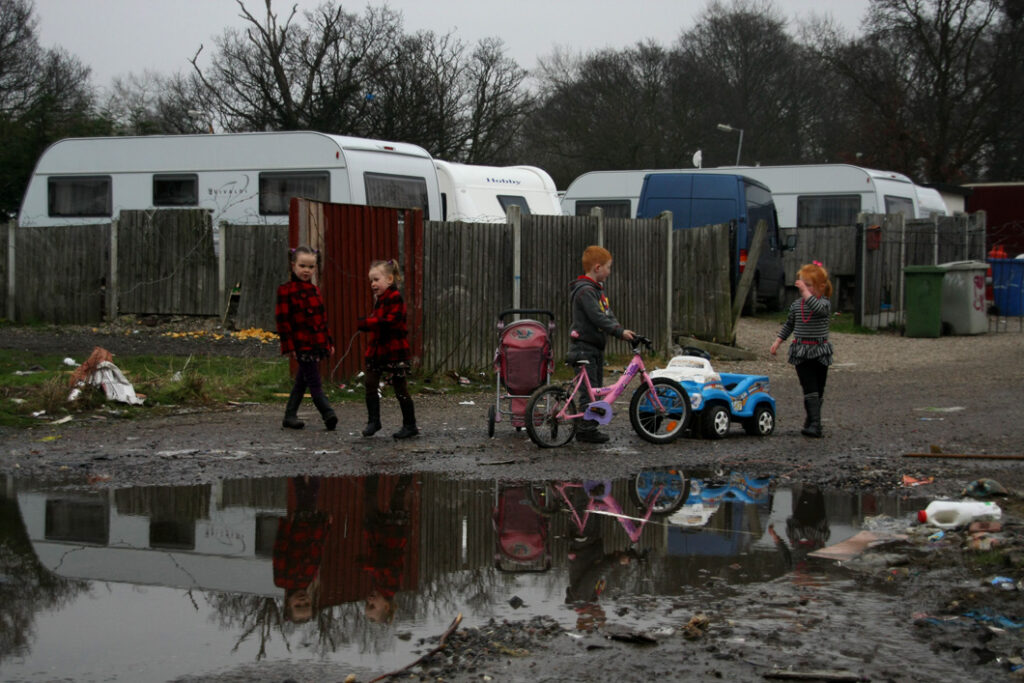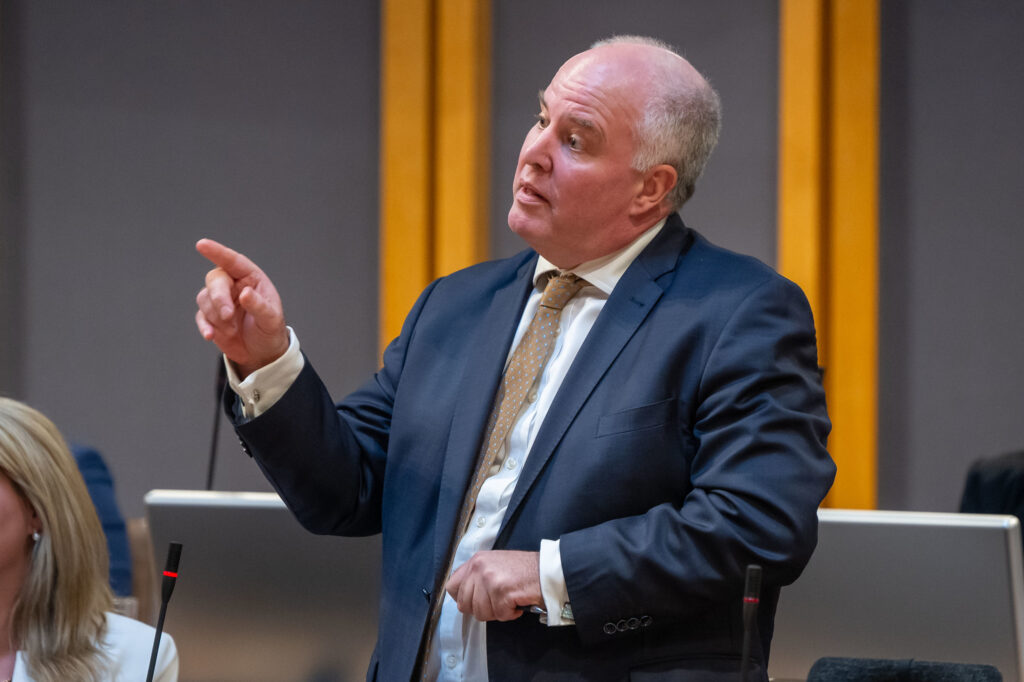Gypsy and Traveller communities face growing racism and discrimination in the UK, including Wales, writes Martin Gallagher
In March 2023, Gareth Davies MS took to the Senedd and relayed how he deems Wales to have ‘too many sites’, for Gypsies, Roma and Traveller (GRT) communities.
He later described the Welsh Government’s statutory duty to provide a site in each local authority as a ‘woke agenda’. Davies continued to cite untruthful statements such as that we don’t ‘pay our way’ or we do not contribute to society, amongst the usual stereotypes. He ended by telling the Senedd that the message from local authorities that reject planning for GRT sites was clear: ‘We don’t want Gypsies and Travellers near us’.
Unfortunately for an Irish Traveller like me who enjoys politics, this was only 50 seconds into his speech, which continued with a vile rant citing outdated and untrue headlines that we have become accustomed to. Crucially, this discriminatory language used towards the GRT community by an elected representative is not an isolated incident in England and Wales. In 2011, the then-Prime Minister David Cameron implied that he would not support GRT communities by supporting the Dale Farm evictions. Former Labour frontbencher Diane Abbott also recently stated that GRT communities experience prejudice comparable to what red-haired people experience, as opposed to experiencing racism.
On the A494 road in North Wales, you used to see road signs highlighting that ‘polluted air can kill’ only 300 yards before an entrance to a GRT site situated between the road and a human waste treatment plant
GRT communities are one of the most marginalised groups in the UK. We face inequalities in all areas of life. This is most clearly displayed in the realm of housing, as there are not enough sites for GRT families to practice their nomadic tradition safely. The UK Parliament recently highlighted that it would take up to 27 years to meet GRT accommodation needs.
Most sites provided by local authorities are built in areas that are dangerous for a person’s health, such as near to dual carriageways, recycling plants, or human waste plants. Ironically, on the A494 road in North Wales, you used to see road signs highlighting that ‘polluted air can kill’ only 300 yards before an entrance to a GRT site situated between the road and a human waste treatment plant. I lived on this site for many years, and the daily smell of waste was nauseating, to the point we would have to leave for a while. My health also worsened dramatically due to the pollution; at not even 40 years old, I now have chronic asthma and struggle with breathing daily. This has been brought to the attention of the Welsh Government and Flintshire, Gwynedd and Wrexham councils; however, there have been no plans to move the residents to an area with safer and less polluted air.
Families who display interest in purchasing land to build their own site are met with public and political opposition. In St. Asaph, a petition against a private site collected over 1,000 signatures as part of a town-wide campaign, with meetings that held audiences into the hundreds. Unfortunately, there was a large increase in hate speech and anti-GRT language, which filtered onto banners and posters displayed around the town and even schools that the GRT family in question had attended for many years.
Innovative. Informed. Independent.
Your support can help us make Wales better.
In 2022, the UK Government introduced the Police, Crime, Sentencing, and Courts Act, which aimed to decrease trespass on land. This highlighted the attack on nomadic GRT families, who have no access to safe GRT sites due to the lack of provision by councils around the UK. These families are now threatened with having their caravans and vehicles taken from them, leaving them stranded, potentially with children or elderly members of their family that they provide care for, as well as a £2,500 fine. Despite repeated calls and detailed evidence that Part 4 of this Act would disproportionately harm GRT families, this was ignored and still passed into law.
In education, the SHRN National Indicators Report 2021–2022, which surveyed over 120,000 Year 7–11 students in Wales, found that GRT young people rated their life satisfaction the lowest of all ethnic groups, and similarly ranked bottom when asked whether they felt welcome in their schools or liked by their teachers. They were also the group that was bullied the most. Bullying towards GRT students still happens daily, with racist name-calling and stereotypes leading to bullying inside and outside of schools, cyberbullying, and violence. The mental health of GRT young people degrades from a very young age with anxiety and depression stemming from how they are treated as they are growing up.
Gypsies and Travellers have poorer health outcomes than the general population. We have a life expectancy that can be up to 25 years lower than the general population; a higher child mortality rate; and a suicide rate that is seven times higher than the general population. During the Covid-19 pandemic, as part of a ‘mystery shopper’ project, GPs were caught regularly refusing to register GRT people as new patients and refusing to provide appointments, although they did provide places and appointments for non-GRT people who called immediately afterwards. It was also discovered that some local authorities did not provide water, toilets, or safe long-term places for nomadic families to reside during the UK lockdown.
Life as a Gypsy or a Traveller in Wales is very difficult. We understand that we are protected by laws such as the Human Rights Act, but it feels that the rest of society does not know this or simply they do not care
It is also important to highlight how degrading it feels to be refused entry to restaurants, cinemas and pubs with proprietors lacking any fear of the discrimination laws that they know exist and must adhere to, but continuously disregard.
Growing up as a child in the GRT community, my family and I faced discrimination while going about our daily lives. Going to school full of dread forced us to change our accents and pretend we weren’t GRT to prevent being ‘started on’. I have been followed in shops and harassed outside my home. In my first job at a major retail chain, I was shown CCTV footage of residents from the site I lived on as part of a ‘How to Recognise a Traveller’ training session and was told that I ‘looked clean for a Gypsy’ during a professional meeting.
Life as a Gypsy or a Traveller in Wales is very difficult. We understand that we are protected by laws such as the Human Rights Act, but it feels that the rest of society does not know this or simply they do not care. We know that Wales is aiming to become an anti-racist country in the coming years; however, it feels that society will never move on from the hatred shown towards GRT communities.
There will never be a successful anti-racist Wales unless substantial change is implemented. Yet when policymakers and elected members continue to be very vocal about how they do not want us in their constituency, where we likely have lived for many, many years, how can GRT communities ever feel confident that Wales will ever accept us?
This article was commissioned and edited by Gwenno Robinson thanks to the Books Council of Wales’ New Audiences Fund.
All articles published on the welsh agenda are subject to IWA’s disclaimer. If you want to support our work tackling Wales’ key challenges, consider becoming a member.





